It was in Cheyne Walk that I met my policeman. I had got off the ’bus at Battersea Bridge, and was seeking my way to Oakley Street, where I had been directed to lodgings described as excellent. He was a large, fat man, with a heavy black moustache; and he had a very pleasant manner. When I came out that evening for a walk along the Embankment I came across him on Albert Bridge, at the “bottom,” as they say over there, of my street.
“You’re still here, sir,” he remarked cheerfully. I asked him how long Mr. Whistler’s Battersea Bridge had been gone, and he told me I forget how many years. He had seen it and had been here all the while. In the course of time he directed me a good deal about in Chelsea, and so it was that I came to chat with him frequently in the evenings, for he “came on” at six and was “off” some time early in the morning.
I was a source of some considerable interest to him with my odd foreign ways. “When are you going ’ome?” he asked me one day when our friendship had ripened.
“Oh, some time in the fall,” I replied.
“In the fall?” he queried in a puzzled way.
“Why, yes,” I said; “September or October.”
“Oh,” he remarked, “in the autumn.” And I heard him murmur musingly, “In the fall of the leaves.”
Sometimes I met him in the company of his colleague, the “big un,” or “baby,” as I learned he was familiarly called, a very tall man with enormous feet clad in boots that glistened like great mirrors, who rocked as he walked, like a ship. My friend had very bright eyes. They sparkled with merriment one day when he said to the big un, nodding toward me, “He’s going ’ome in the fall.”
It was a warm evening along the side of old Father Thames. My friend, with much graceful delicacy, made it known to me that a drop of “ile” now and then did not go bad with one tried by the cares of a policeman. So we set out for the nearby “King’s Head and Eight Bells.” When we came to this public house I discovered that it was apparently absolutely impossible for my friend to go in. He instructed me then in this way: I was to go in alone and order for my friend outside a pint of “mull and bitter, in a tankard.” The potman, he informed me, would bring it out to him. The expense of this refreshment was not heavy; it came to one penny ha’penny. The services of the obliging potman were gratuitous.




